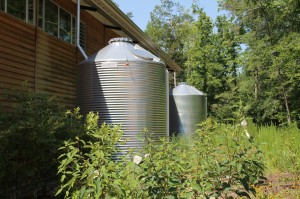Christine E. Boyle, PhD is a Post-doctoral Fellow at the Environmental Finance Center. Dr. Boyle investigates new models for sustainable local water and energy provision.
Despite mounting evidence that rainwater harvesting systems present a cost-effective option for water and stormwater utilities to cope with protecting their water supply, a recent straw poll of rainwater harvesting industry professionals gathering at the recent American Rainwater Catchment System Association (ARCSA) annual meeting indicated utilities are more commonly viewed as foes, and not friends, of the rainwater harvesting industry. Aside from a few notable exceptions (i.e. Chapel Hill, NC, Austin, TX, San Diego, CA), utility concerns over public health, water sales declines, and a host of other issues have prevented widespread adoption of rainwater harvesting as an alternative water source and stormwater mitigation strategy. This situation presented a puzzle to Dr. Bill Hunt of NC State University, who presented growing evidence of utility-sponsored rainwater harvesting systems in water scarce locales of New Zealand, Australia, and Singapore at the ARCSA meeting.
A recent Environmental Finance Center study investigates public and private financing options for distributed rainwater harvesting systems. We use the City of Durham’s water departments (water and stormwater) to demonstrate how several different rainwater system finance programs could be structured. Study results suggest that a fully self-financed cistern installation will not perform well financially, but modest incentives offered through the city utility can create a financially viable program structure – for both the school property owners and the utilities. Third–party ownership, on-bill financing, and other public private partnership arrangements present alternative financing arrangements to minimize risk of cistern program financing and leverage limited capital resources.
The findings of this study present a case for the viability of a utility-based incentive program for rainwater harvesting, under a few conditions.
- Integration, or at least close cooperation of stormwater and water utilities is necessary to coordinate such a program – in particular issuing stormwater credits, metering cisterns, and monitoring cistern performances.
- A viable public –private rainwater program must build upon existing “to-scale” properties to meet performance goals. Large property owners and institutions (i.e. schools, medical facilities, and universities) are strong candidates for cistern partners, as they can help the city achieve scale in stormwater mitigation and conservation efforts and also have capacity for plumbing and grounds maintenance to operate the cistern systems. Small-scale installations can be built, but won’t be under the city’s monitoring or performance evaluations.
- Both public and private capital are necessary to make a viable financial case for cistern installation – given the private and public benefits of cisterns tailoring of finance programs to bring both sources of capital to the table will create a viable path forward for more widespread adoption of rainwater harvesting systems.
Download the full report here.



3 Responses to “The slow march forward of utilities embracing rainwater harvesting as an alternative water supply”
Aleks Drilling
Christine, I agree. Utility companies are often seen as big bad monsters when in reality they do have the means and (I believe) the good intentions to do something positive for our communities and the environment. I’m sure that if our local minds collaborate together we can get utility companies to utilize rainwater harvesting for the good.
Julian Cassell
Although it seems you have a battle on your hands in persuading utilities about the benefits of rainwater harvesting for all concerned, it still appears to me that you are miles ahead in comparison to the UK. Here, as far as I’m aware, there is no funding/grants available from any source to install rainwater harvesting systems, so it tends to be down to the individual to pay their own way.
Although we theoretically have plenty of water in the UK, in reality, we are often put under drought warning, with water use restrictions (yes really), and so maybe it is time that the utilities looked seriously at how partnerships can be evolved with both private and public bodies. After all, it would seem that on your side of the pond you can provide evidence for cost effectiveness, so if ‘they’ are worried about their profits, maybe they needn’t be.
Kind Regards,
Julian
Christine Boyle
Great to see the rainwater harvesting discussion is reaching across the Pond! In fact, here in the southeastern United States we face similar challenges where conservation is viewed as bad business for water utilities.
The main argument for rainwater harvesting in rainy places is certainly the stormwater control angle where this simple technology can stop pollution from running over oily roads and chemical laden grass and polluting our lakes and rivers.
Thanks for the reply Julian!